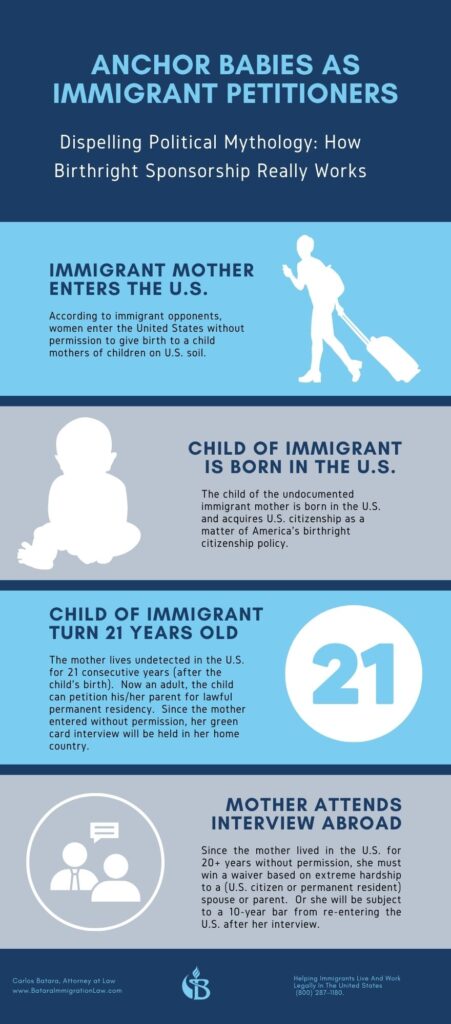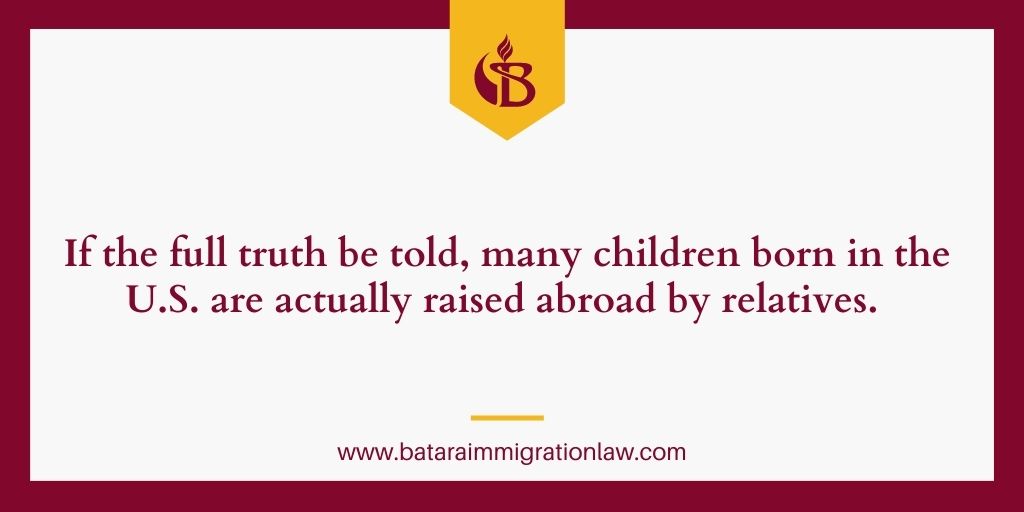
At a recent green card interview, the officer asked my client, “Why did you return home in 1985 and 1988?”
“To give birth to my two children,” she responded.
“I couldn’t afford the health care here.”
The officer gave me a confused, dazed look.
I couldn’t bite my lip.
“Sort of kills the anchor baby rhetorical nonsense, doesn’t it?”
Political Hijacking The Constitution
The issue properly formulated is not about anchor babies, a mean-spirited term used by immigration opponents.
Rather, the issue is birthright citizenship under the 14th Amendment.
Stated simply, are children born in the United States entitled to U.S. citizenship?
As noted in The Anchor Baby Debate: U.S. Citizenship For Immigrant Children, the matter was deemed settled nearly 150 years ago.
Ratified in 1868, the 14th Amendment states:
“All persons born or naturalized in the United States, and subject to the jurisdiction thereof, are citizens of the United States and of the state wherein they reside.”
Unfortunately, in politics, nothing is sacred. Especially when it comes to immigration politics.

Now, a short-sighted effort to revise American history threatens to raise its ugly head again.
Since a new campaign season for president has started, the race to be seen as the strictest, harshest, cruelest opponent of immigrants is on again.
The current Florida governor, wanting to supplant former president Trump as the nastiest anti-immigrant in the political arena, recently announced he intends to eliminate birthright citizenship for the children of immigrants if elected.
Of course, DeSantis is a Johnny-come-lately to the issue.
Several years ago, while in office, Trump said that he was looking at ending birthright citizenship, a position he still holds onto.
Both overlook the unlikely legal prospect of prevailing in court.
(It’s not the first time anti-immigrant folks have hinted at such efforts. Their xenophobic positions, though poorly reasoned, must be countered. In other words, the recent hardline statements should not be taken lightly by immigrant supporters.)
The rhetoric serves a primary political purpose. To inflame the passions of the anti-immigrant voting base. Especially as the election season heats up.
For nearly three decades, anti-immigration zealots, sensing an opportunity to influence voters based on fear-mongering, have seized upon the issue. Over and over again, they present images of immigrants crossing the border in waves, sucking up our resources until there is nothing left for citizens born here.
They equate birthright citizenship with anchor baby imagery.

Pregnant mothers come to the U.S., the disinformation stresses, to ensure their children are born on American soil. Once that is accomplished, the children can turn around and sponsor their parents for lawful immigration status.
To an extent, the false story line has worked.
Much of the public does not understand the immense legal difficulties or far-reaching social consequences of eradicating the 14th amendment.
Moreover, like other anti-immigrant propaganda, the anchor babies terminology heightens anxieties.
Yet, the panic is unfounded.
The Permanent Residence Process Is A Deterrent To Anchor Babies Citizenship
On the one hand, the anchor babies hyperbole is based on a flawed presentation of the permanent residence process.
I have served for almost 30 years as a Riverside immigration lawyer. I’ve never met anyone who came here to obtain citizenship through an unborn child.
Even if that was a deliberate plan, the likelihood of success is thin. To carry out such a far-fetched idea would take over 21 years. In fact, 33 years or longer.
Allow me to explain.

To begin, the unborn child would have to turn 21 before he could petition his parent for a family-based visa.
Second, from the time the petition for the parent is filed, the parent has to wait several more years for their green card interview date.
Then, since the parent arrived here or lived in the U.S. all that time without permission, they would not be eligible to interview here. Their paperwork would proceed under the rules for consular processing.
This means the parent would have to return home for their green card interview. Last but not least, the parent would need to win a rarely-granted family unity I-601 waiver to be allowed back into the U.S. (But only if they had a lawful resident or U.S. citizen parent or spouse meets the requirement of a qualifying relative.)
Maybe opponents’ rhetoric accurately portrays the motivation of some immigrants – but the true figures are far, far, far less than they suggest.
And if the full truth be told, many children born in the U.S. are actually raised abroad by relatives.

Anchor Babies Fact Versus Fiction
On the other hand, the anchor baby innuendos do not accurately reflect social realities.
According to a report from the Urban Institute, covering immigration families:
- One quarter of children living in the U.S. have at least one immigrant parent. This equals 18.6 million. Of this amount, 16.8 million of the children are U.S. citizens.
- Most of these children (61%) have at least one parent who is a U.S. citizen. 5 million have an immigrant-born parent and a United States-born parent. 6.4 million have two-immigrant parents but at least one has naturalized. The other 7.2 million children have two immigrant parents. (It is unknown how many of these parents are already lawful pemanent residents.)
- The majority of children with immigrant parents are not new households. Of all children living with immigrant parents, 77% (14 million) are with parents who have resided in the U.S. for 10 years or longer. 12% (2.4 million) are with parents who have lived here 5 – 9 years, and 11% (2 million) are with parents who have lived here less than five years.
- In addition, according to a Pew Research Center study regarding 250,000 babies born to undocumented immigrant parents during a one-year review. Less than 1% of these children were born to parents who lived here less than two years before the children’s births. (And, as noted above, many of these children have one parent who is either a U.S. citizen or a lawful permanent resident.)
These statistics contradict the claims of immigration reform opponents who claim unceasing waves of immigrants come to the U.S. simply to give birth to children here.
As a citizenship attorney, I know the reality for immigrants and citizens alike is love just happens.
Giving birth to a child born in the United States is normally a byproduct of living here.
Immigration opponents place the cart before the horse. They need to be honest. Lying to constituents is no way to serve the public.
It also distorts the social realities of immigrant families upon which our immigration polices should be built.
By Carlos Batara, Immigration Law, Policy, And Politics




